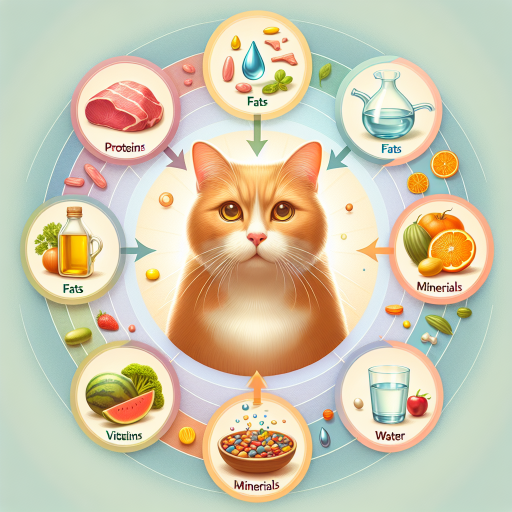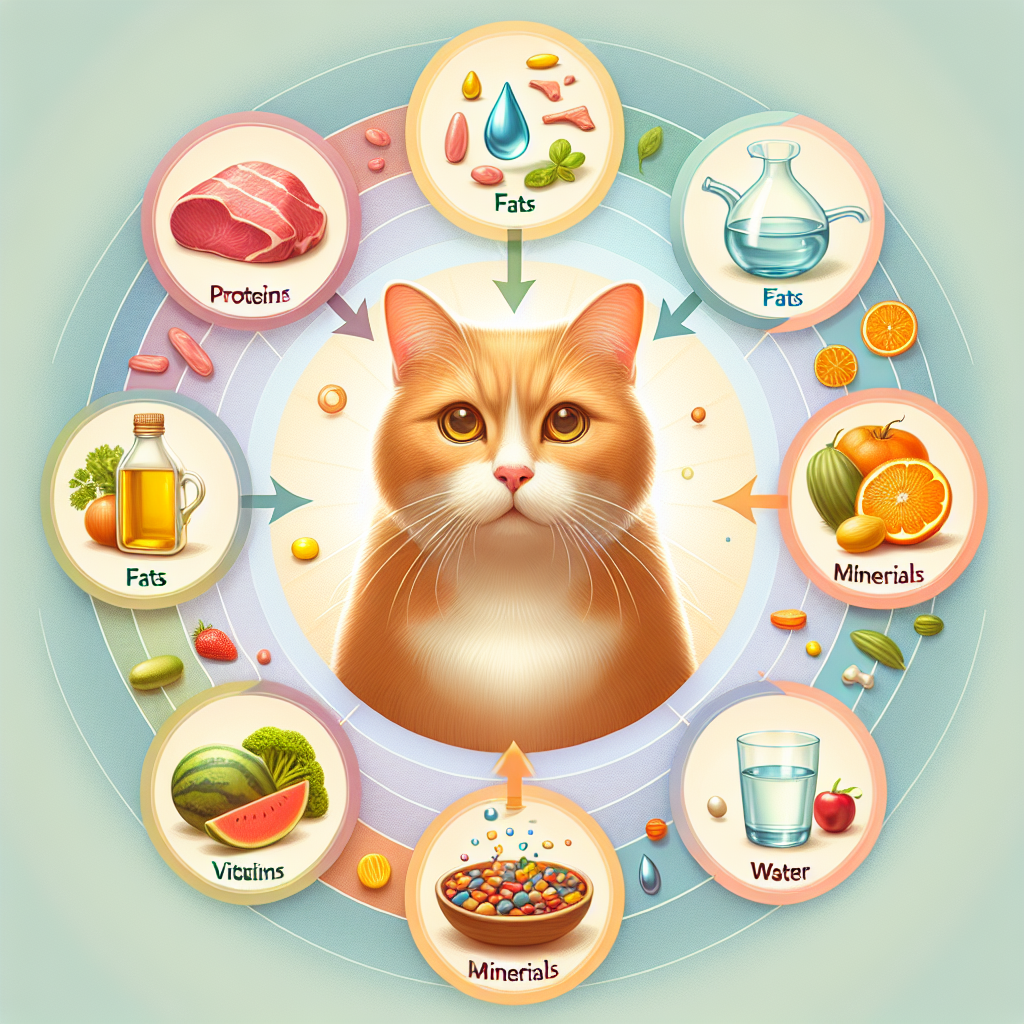Welcome to the Ultimate Guide to Cat Nutrition!
Are you a cat parent who wants to ensure their furry friend is getting the best nutrition possible? Look no further! In this guide, we will delve into the essential components of a cat’s diet to help you make informed decisions about what to feed your beloved feline companion.
Why is Cat Nutrition Important?
Just like humans, cats require a balanced diet to stay healthy and thrive. Proper nutrition plays a vital role in maintaining their overall well-being, from supporting their immune system to keeping their coats shiny and their energy levels up. By understanding the key elements of a cat’s diet, you can provide your cat with the nutrients they need to lead a long and happy life.
Throughout this guide, we will explore the importance of protein, taurine, fatty acids, vitamins, minerals, and water in a cat’s diet. Each of these components plays a crucial role in supporting your cat’s health and vitality, so it’s essential to make sure your cat’s food contains the right balance of these nutrients.
Whether you’re a new cat owner or a seasoned pro looking to brush up on your knowledge, this guide will provide you with valuable insights into cat nutrition. So, grab a cup of tea, snuggle up with your kitty, and let’s dive into the world of feline nutrition together!
Protein
Protein is an essential nutrient that plays a crucial role in the overall function of our bodies. It is often referred to as the building block of life, and for good reason. Protein is responsible for repairing and building tissues, making enzymes and hormones, and supporting a healthy immune system. It is made up of amino acids, which are the building blocks of protein.
When it comes to protein sources, there are both animal-based and plant-based options. Animal sources of protein include meat, poultry, fish, eggs, and dairy products. Plant-based sources of protein include beans, lentils, nuts, seeds, and tofu. It’s important to include a variety of protein sources in your diet to ensure you are getting all the essential amino acids your body needs.
How much protein do you need?
The amount of protein you need can vary depending on your age, gender, weight, and activity level. As a general guideline, the Recommended Dietary Allowance (RDA) for protein is 0.8 grams per kilogram of body weight. This means that if you weigh 150 pounds (68 kilograms), you would need about 55 grams of protein per day.
Benefits of protein
- Muscle growth and repair: Protein is essential for building and repairing muscles, making it an important nutrient for athletes and those who engage in regular exercise.
- Weight management: Protein can help you feel full and satisfied, which can aid in weight management by reducing cravings and overeating.
- Immune support: Protein is needed to make antibodies that help fight off infections and illness, supporting a healthy immune system.
How to incorporate more protein into your diet
There are many ways to increase your protein intake, whether you’re a meat-eater, vegetarian, or vegan. Try adding protein-rich foods like chicken, fish, tofu, beans, and nuts to your meals. You can also include protein-rich snacks like Greek yogurt, hard-boiled eggs, or protein bars to help meet your daily needs.
Remember, balance is key when it comes to protein intake. Aim to include a variety of protein sources in your diet, along with plenty of fruits, vegetables, whole grains, and healthy fats to support overall health and well-being.
The Importance of Taurine for Your Cat’s Health
When it comes to keeping your furry friend happy and healthy, providing them with a balanced diet is crucial. One essential nutrient that often gets overlooked is taurine. Taurine is an amino acid that plays a vital role in maintaining your cat’s overall health and well-being.
So, why is taurine so important for your cat? Let’s delve into the reasons why this amino acid is a crucial part of your cat’s diet:
- Visual and Heart Health: Taurine is essential for maintaining your cat’s vision and heart health. It helps support the function of the retina, ensuring that your cat has clear eyesight. Additionally, taurine plays a vital role in regulating the heart’s function, keeping it strong and healthy.
- Reproductive Health: Taurine is also important for your cat’s reproductive health. It plays a crucial role in fetal development and is essential for maintaining a healthy pregnancy. Ensuring that your cat gets enough taurine is vital for the health of both the mother and her kittens.
- Immune System Support: Taurine is known for its immune-boosting properties. It helps support your cat’s immune system, making them more resistant to illnesses and infections. By including taurine in your cat’s diet, you can help keep them healthy and strong.
- Muscle Function: Taurine is also essential for maintaining your cat’s muscle function. It helps support muscle development and aids in muscle contractions, ensuring that your cat stays active and healthy.
So, how can you ensure that your cat is getting enough taurine in their diet? The best way to ensure that your cat is getting enough taurine is to provide them with a high-quality cat food that is specifically formulated to meet their nutritional needs. Look for cat foods that list taurine as one of the ingredients and consult with your veterinarian to determine the right amount of taurine your cat needs based on their age, size, and health status.
Remember, a balanced diet is key to keeping your cat healthy and happy, and taurine is a crucial part of that diet. By ensuring that your cat is getting enough taurine, you can help support their overall health and well-being.
Alright, let’s talk about fatty acids! Now, I know the word “fatty” might sound a bit intimidating, but trust me, these are the good kind of fats that your furry friend needs to stay healthy and happy.
What are Fatty Acids?
Fatty acids are essential nutrients that play a crucial role in your pet’s overall well-being. They are a type of fat that provides energy, helps with the absorption of vitamins, and supports various bodily functions.
Types of Fatty Acids
There are two main types of fatty acids that your pet needs: omega-3 and omega-6. Omega-3 fatty acids, such as EPA and DHA, are known for their anti-inflammatory properties and are great for keeping your pet’s skin and coat healthy. You can find omega-3 fatty acids in fish oil, flaxseed oil, and walnuts.
On the other hand, omega-6 fatty acids, like linoleic acid, are important for maintaining your pet’s skin and coat health as well. They also play a role in supporting your pet’s immune system and promoting healthy growth. Sources of omega-6 fatty acids include vegetable oils, poultry fat, and grains.
Why are Fatty Acids Important?
Ensuring that your pet gets an adequate amount of fatty acids in their diet is crucial for their overall health. Fatty acids help to improve skin and coat health, reduce inflammation, support brain function, and promote a healthy immune system.
How to Incorporate Fatty Acids into Your Pet’s Diet
There are several ways you can ensure that your pet is getting enough fatty acids in their diet. One option is to feed them a high-quality pet food that is specifically formulated to provide the right balance of omega-3 and omega-6 fatty acids. You can also add supplements like fish oil or flaxseed oil to their meals.
It’s important to consult with your veterinarian before making any changes to your pet’s diet or adding supplements. They can provide guidance on the best options for your pet’s individual needs.
Conclusion
So, there you have it! Fatty acids are an essential part of your pet’s diet and play a vital role in keeping them healthy and happy. By ensuring that your pet is getting the right balance of omega-3 and omega-6 fatty acids, you can help support their overall well-being and longevity. Remember, a healthy pet is a happy pet!
Vitamins
Hey there! Let’s talk about something that is essential for our overall health and well-being – vitamins. These little powerhouses play a significant role in keeping our bodies functioning properly and maintaining good health. So, let’s dive in and explore the world of vitamins!
Types of Vitamins
Vitamins are classified into two main categories: water-soluble and fat-soluble. Water-soluble vitamins, such as vitamin C and the B vitamins, dissolve in water and are not stored in the body. This means we need to consume them regularly through our diet. On the other hand, fat-soluble vitamins, like vitamins A, D, E, and K, are stored in the body’s fatty tissues and liver, which means we don’t need them as frequently.
Importance of Vitamins
Vitamins play a crucial role in various bodily functions, such as boosting our immune system, supporting bone health, promoting healthy skin, and aiding in energy production. Each vitamin has its own unique benefits, so it’s important to include a variety of vitamin-rich foods in our diet to ensure we get all the nutrients our bodies need.
Food Sources
One of the best ways to ensure we are getting an adequate amount of vitamins is by eating a balanced diet that includes a variety of fruits, vegetables, whole grains, lean proteins, and dairy products. Different foods contain different vitamins, so it’s important to mix it up and not rely on just a few sources.
Supplements
While it’s always best to get our vitamins from food sources, sometimes our diets may not provide all the nutrients we need. In these cases, supplements can be a helpful way to fill any nutritional gaps. However, it’s important to consult with a healthcare professional before starting any new supplement regimen to ensure we are taking the right vitamins in the proper dosages.
Conclusion
So there you have it – the wonderful world of vitamins! These micronutrients may be small, but they play a mighty role in keeping us healthy and strong. Remember to eat a balanced diet rich in a variety of nutrient-dense foods to ensure you are getting all the vitamins your body needs. And if in doubt, always consult with a healthcare professional for personalized advice.
VI. Minerals
Hey there! Let’s talk about minerals – those essential nutrients that our bodies need to function properly. Minerals are inorganic substances that play a vital role in various bodily functions, from building strong bones to maintaining a healthy heart. So, let’s dive in and learn more about these important nutrients!
1. Calcium
One of the most well-known minerals, calcium is crucial for building and maintaining strong bones and teeth. It also plays a role in muscle function, nerve transmission, and blood clotting. Make sure to include calcium-rich foods like dairy products, leafy greens, and fortified foods in your diet to meet your daily requirements.
2. Iron
Iron is essential for the production of red blood cells, which carry oxygen throughout the body. A deficiency in iron can lead to fatigue, weakness, and anemia. Include iron-rich foods like lean meats, beans, and fortified cereals in your diet to ensure you’re getting an adequate intake of this important mineral.
3. Potassium
Potassium is crucial for maintaining proper nerve and muscle function, as well as regulating fluid balance in the body. It’s found in abundance in fruits, vegetables, and legumes, so make sure to include these foods in your diet to meet your potassium needs.
4. Magnesium
Magnesium plays a role in over 300 enzymatic reactions in the body, including energy production, muscle function, and bone health. You can find magnesium in foods like nuts, seeds, whole grains, and leafy greens, so be sure to include these foods in your diet to meet your magnesium requirements.
5. Zinc
Zinc is essential for immune function, wound healing, and DNA synthesis. It’s found in foods like oysters, red meat, poultry, and beans, so make sure to include zinc-rich foods in your diet to support your overall health.
6. Sodium
Sodium is an important mineral that helps maintain fluid balance in the body and is crucial for nerve and muscle function. However, too much sodium can lead to high blood pressure and other health issues. Try to limit your intake of processed foods and opt for fresh fruits and vegetables to keep your sodium intake in check.
7. Iodine
Iodine is essential for thyroid function and the production of thyroid hormones, which regulate metabolism. You can find iodine in foods like seafood, dairy products, and iodized salt, so make sure to include these foods in your diet to meet your iodine requirements.
So there you have it – a brief overview of some important minerals and their roles in the body. Remember to eat a varied and balanced diet to ensure you’re getting an adequate intake of all the essential minerals your body needs to thrive!
Water is essential for your cat’s health and well-being. Just like humans, cats need water to survive and thrive. In fact, water makes up about 60-70{7493f20db4b8ae176bcbf41d5f5213ca77630d75c7ca8b92d85b990b084e1c85} of a cat’s body weight, so it’s crucial to ensure that your furry friend has access to fresh, clean water at all times.
Why is water important for cats?
Water plays a vital role in a cat’s body. It helps with digestion, regulates body temperature, transports nutrients throughout the body, and flushes out waste products. Without an adequate amount of water, your cat can become dehydrated, which can lead to serious health problems.
How much water does a cat need?
Cats typically need about 60-80ml of water per kilogram of body weight per day. However, this can vary depending on factors such as age, activity level, and health status. It’s important to monitor your cat’s water intake and ensure that they are drinking enough to stay hydrated.
How can I encourage my cat to drink more water?
Some cats are picky drinkers and may not drink enough water on their own. Here are some tips to encourage your cat to stay hydrated:
- Provide fresh, clean water in a clean bowl at all times.
- Consider using a cat fountain, as some cats prefer running water.
- Offer wet food, which has a higher moisture content than dry food.
- Add water to your cat’s food to increase their water intake.
- Place water bowls in multiple locations throughout your home.
Signs of dehydration in cats
It’s important to be aware of the signs of dehydration in cats so that you can address it promptly. Some common signs include:
- Dry, tacky gums
- Lethargy
- Loss of appetite
- Sunken eyes
- Decreased skin elasticity
If you notice any of these signs in your cat, it’s important to consult with your veterinarian right away. Dehydration can be a serious condition that requires prompt treatment.
Conclusion
Water is a vital nutrient for cats and plays a crucial role in their overall health and well-being. By ensuring that your cat has access to fresh, clean water at all times and monitoring their water intake, you can help them stay hydrated and healthy. Remember, a well-hydrated cat is a happy cat!





